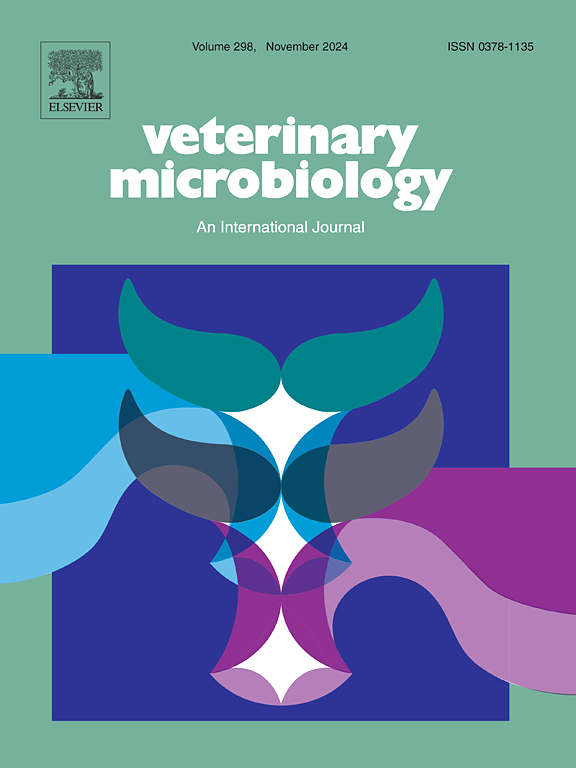核转运因子ip4通过PCV2修饰定位,促进病毒复制
IF 2.7
2区 农林科学
Q3 MICROBIOLOGY
引用次数: 0
摘要
核转运受体(NTRs)是病毒劫持的关键靶标,可增强病毒的复制和传播。本研究通过质谱、共免疫沉淀、谷胱甘肽- s转移酶拉下实验,证实了猪圆环病毒2型(PCV2)衣壳蛋白(Cap)与核转运受体输入蛋白4 (IPO4)之间的直接相互作用。精细图谱显示,Cap的n端氨基酸残基1-100构成了有效结合IPO4的关键结构域。进一步的研究表明,Cap与IPO4结合不会触发其核进口功能,也不会影响Cap的降解。相反,它导致IPO4从细胞质转移到细胞核。IPO4敲低可显著降低细胞内PCV2 Cap水平,抑制PCV2复制,提示IPO4在功能上参与促进病毒复制。总的来说,我们的研究结果表明,在PCV2感染期间,IPO4与Cap结合并迁移到细胞核,促进病毒复制。本文章由计算机程序翻译,如有差异,请以英文原文为准。
Nuclear transport factor IPO4 modifies localization by PCV2 and facilitates viral replication
Nuclear transport receptors (NTRs) serve as critical targets hijacked by viruses to enhance their replication and dissemination. In this study, we confirmed the direct interaction between the capsid protein (Cap) of porcine circovirus type 2 (PCV2) and importin 4 (IPO4), a nuclear transport receptor, through mass spectrometry, co-immunoprecipitation, and glutathione-S-transferase pull-down assays. Fine mapping revealed that the N-terminal amino acid residues 1–100 of Cap constitute the critical domain for efficient binding to IPO4. Further investigation showed that the binding of Cap to IPO4 did not trigger its nuclear import function or affect Cap degradation. Instead, it caused IPO4 to translocate from the cytoplasm to the nucleus. Knockdown of IPO4 significantly reduced intracellular levels of PCV2 Cap and inhibited PCV2 replication, suggesting that IPO4 is functionally involved in facilitating viral replication. Collectively, our findings demonstrate that during PCV2 infection, IPO4 binds with Cap to migrate to the nucleus, facilitating viral replication.
求助全文
通过发布文献求助,成功后即可免费获取论文全文。
去求助
来源期刊

Veterinary microbiology
农林科学-兽医学
CiteScore
5.90
自引率
6.10%
发文量
221
审稿时长
52 days
期刊介绍:
Veterinary Microbiology is concerned with microbial (bacterial, fungal, viral) diseases of domesticated vertebrate animals (livestock, companion animals, fur-bearing animals, game, poultry, fish) that supply food, other useful products or companionship. In addition, Microbial diseases of wild animals living in captivity, or as members of the feral fauna will also be considered if the infections are of interest because of their interrelation with humans (zoonoses) and/or domestic animals. Studies of antimicrobial resistance are also included, provided that the results represent a substantial advance in knowledge. Authors are strongly encouraged to read - prior to submission - the Editorials (''Scope or cope'' and ''Scope or cope II'') published previously in the journal. The Editors reserve the right to suggest submission to another journal for those papers which they feel would be more appropriate for consideration by that journal.
Original research papers of high quality and novelty on aspects of control, host response, molecular biology, pathogenesis, prevention, and treatment of microbial diseases of animals are published. Papers dealing primarily with immunology, epidemiology, molecular biology and antiviral or microbial agents will only be considered if they demonstrate a clear impact on a disease. Papers focusing solely on diagnostic techniques (such as another PCR protocol or ELISA) will not be published - focus should be on a microorganism and not on a particular technique. Papers only reporting microbial sequences, transcriptomics data, or proteomics data will not be considered unless the results represent a substantial advance in knowledge.
Drug trial papers will be considered if they have general application or significance. Papers on the identification of microorganisms will also be considered, but detailed taxonomic studies do not fall within the scope of the journal. Case reports will not be published, unless they have general application or contain novel aspects. Papers of geographically limited interest, which repeat what had been established elsewhere will not be considered. The readership of the journal is global.
 求助内容:
求助内容: 应助结果提醒方式:
应助结果提醒方式:


